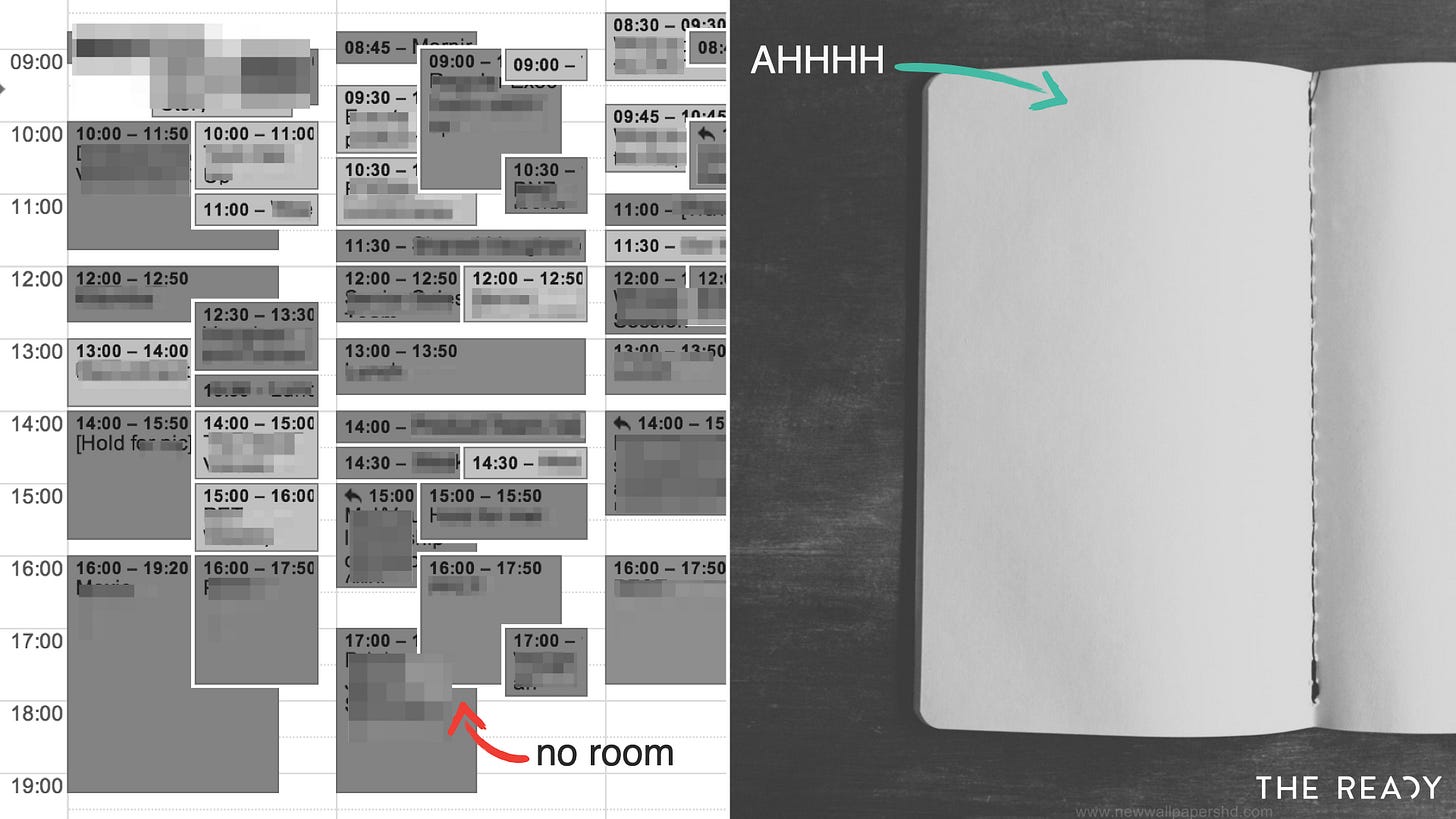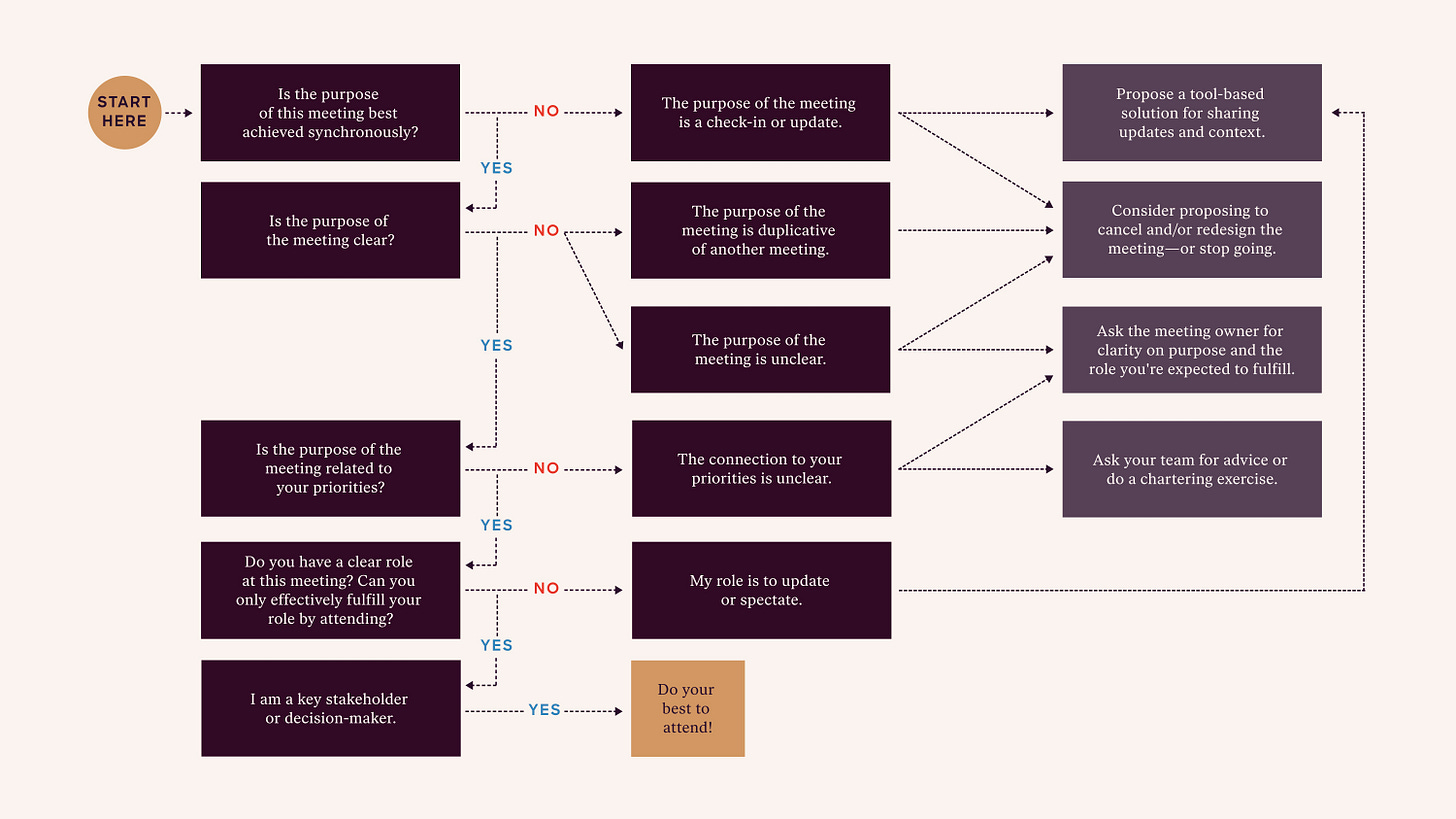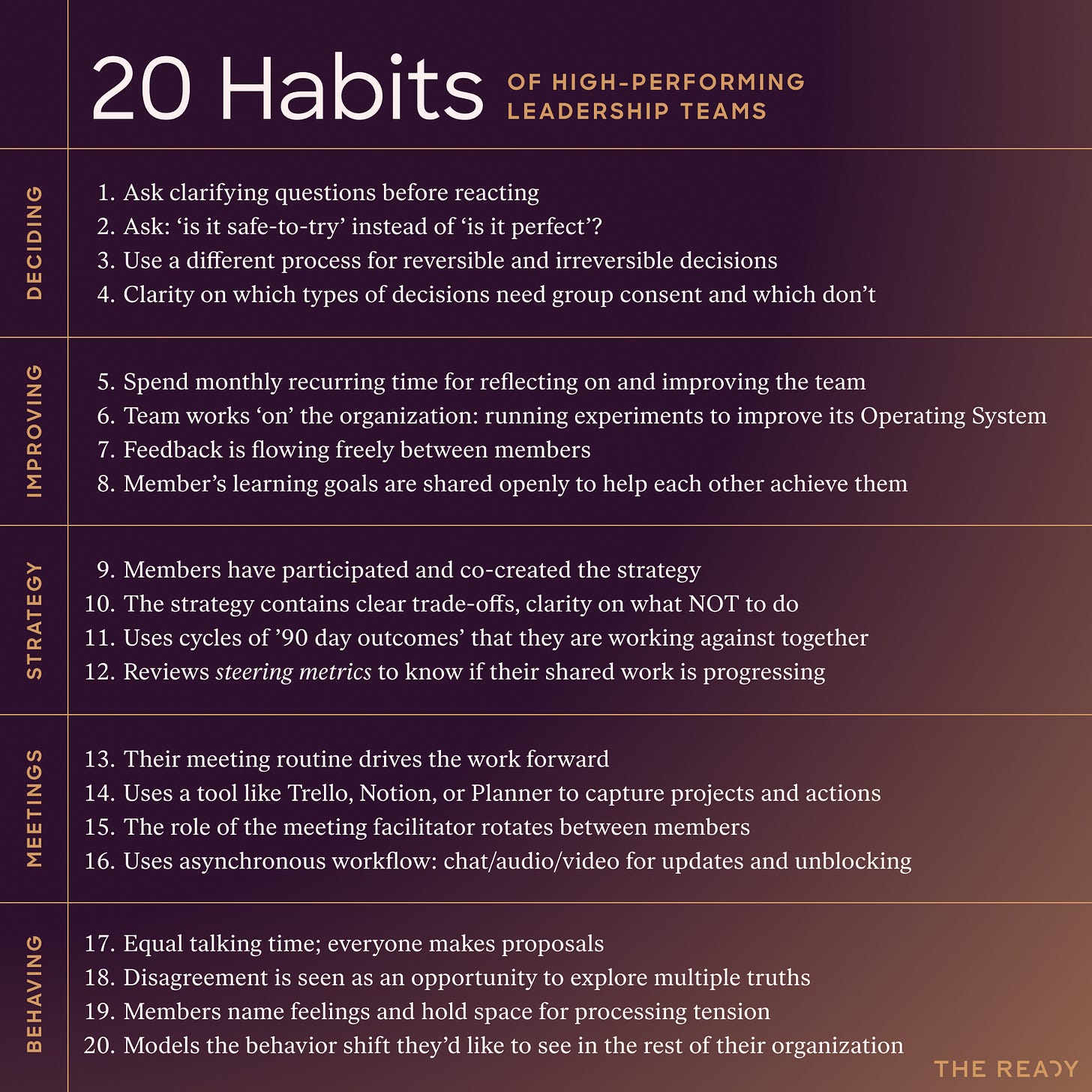Four meeting habits of high-performing leadership teams
How to have amazing meetings as a leadership team
Many leaders spend >80% of their workweek in meetings. Why? Because they default to scheduling a meeting for almost anything 🤔 It doesn’t have to be that way.
"Bad meetings destroy good organizations. Bad meetings sap momentum and motivation. Bad meetings cultivate feelings of inefficacy and futility… [but] meetings done right are among the most powerful tools available to teams."
- Sam Spurlin (Partner at The Ready and author of The Deliberate)
This month, I’m covering the 20 habits of high-performing leadership teams. Last week I covered strategy habits. This week is all about the meeting habits I’ve observed in the best leadership teams:
#13 Their meeting routine drives the work forward
The best leadership teams in the world run on a heartbeat 💙 — an intentionally designed Operating Rhythm that brings their strategy to life.
An Operating Rhythm is a dedicated routine (meetings, processes, rituals, and events) by which a team comes together to coordinate action, drive operations, serve its members, innovate, and steer the organization.
Here's how to find your Operating Rhythm:
For us to coordinate action, drive operations, innovate, and steer, what kinds of meetings will help?
How often do those meetings need to happen to keep up with the pace of that work?
Who needs to be present to do that specific kind of work?
What design or structure is fit-for-purpose for each meeting?
A well-designed Operating Rhythm eliminates the need for most other meetings. When something unexpected comes up, just slot it into the next meeting that's already on the calendar.
At The Ready, we love this default Operating Rhythm 'stack' for leadership teams:
⚔️ Action Meeting (weekly) - to unblock work & synchronize
🤔 Retrospective (every 4-6 weeks) - to reflect & improve
🎯 Strategy Meeting (quarterly) - to envision the next outcomes
Two tips:
Strive for “minimum viable structure” and continuously evaluate and improve.
Never cancel, move, or negotiate Operating Rhythm meetings. They are sacred to the growth and evolution of the team and organization. They are the well from which all other work flows.
Learn more here: Brave New Work podcast episode: Finding your Operating Rhythm
#14 & #15 Have a rotating role as meeting Facilitator and Scribe + use a tool like Trello, Notion, or Planner to capture projects and actions
To have amazing meetings as a leadership team, have somebody hold the role as Facilitator (ideally not the most senior leader), and somebody else hold the role of Scribe.
“Meetings are filled with good intentions. Decisions are made (supposedly), and next steps are articulated. In the moment, it all feels good, straightforward, and simple. How many times, though, have you left a meeting where the post-meeting email listed you as taking on next steps you don’t remember agreeing to? Or you go to check something your colleague said they’d do, and you realize what you thought they were agreeing to do was not at all what they thought they were agreeing to do.” - Sam Spurlin
The Scribe role makes sure next actions get captured and that the folks they pertain to agree that they’re accurately portrayed. No more walking out of meetings with multiple ideas (or no idea) about who’s doing what. One source of truth!
The Scribe publicly captures decisions and “next actions” (in shared software like Trello, Notion, or Planner) that are discussed during the meeting. By offloading this responsibility to the Scribe, other members don’t have to worry about capturing action items, and there is one shared source of truth about what everyone agreed to do.
The Facilitator guides the team through the structure of the meeting and redirects conversation and attention when it ventures outside the guardrails. However, it is much more than timekeeping or agenda-making. A well-facilitated meeting can shift power dynamics, support flow, and change the energy of a group. Facilitation isn't just about nudging a group to follow a process. It's about creating and holding to structures that enable the team to do its best work. A Facilitator's goal isn’t for the meeting to run smoothly; it’s for the group to improve the way they work together continuously.
As a leadership team, there may be an inclination to appoint an 'external' Facilitator or Scribe - like the secretary of the team if there is one. However, we believe it is better if members of the team take turns filling these roles.
Read more on Action Meetings: How to Host the Best Meeting of the Week
#16 High-performing leadership teams: use an asynchronous workflow for updating and unblocking
ℹ️ Updating: we need to tell someone or the whole team about something that has happened or is about to happen
When you find yourself in a meeting that’s mostly a “report out” or “status update,” consider proposing a working agreement to share these updates asynchronously. Meaning, send an email, Microsoft Teams, or Slack message containing the update. Or maybe you can try recording a short video (via Loom or otherwise). The less time devoted to status updates, the more valuable time a team has together to do whatever needs to be done with the information.
⚔️ Unblocking: we need certain information, make a request or a decision to be able to move forward
Instead of scheduling a separate, 30-minute meeting 2-3 weeks from now when we have an open slot - try to do unblocking in a Teams message or Slack thread. It often takes less than a few minutes to reply, and the work can resume faster. Save your precious meeting time for when unblocking requires a longer, interactive dialogue.
Introducing this habit is not always easy - obviously, at the start, there is no time in the day to consume updates or respond to messages. But if you do this as a collective leadership team, and when you make agreements with people outside the team that come to you, you can start breaking this pattern. You'll start seeing more empty space in the calendar to do strategic thinking and do other important tasks.
Read more: How to get rid of meeting overload
The Ready's latest newsletter is about Meetings and contains a cool decision tree:
🚨 Roundtables for future-oriented leaders
Are you leading a team, or are you a member of a leadership team? Then I’d like to invite you to our leadership roundtables. Register here to get invited to our session on "reinventing strategy" in September.
In this newsletter, I’ve covered habits #13-#16. Stay tuned for #17-#20! Next time: behavioral habits.




